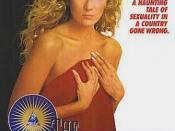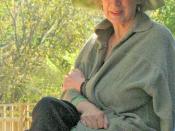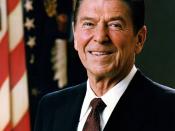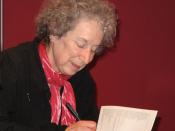The Handmaids Tale Stuart Potter
"Every book is a sort of mushroom cloud thrown up by a large substance of material that has been accumulating for a lifetime."- Margaret Atwood. In reference to her own contemporary anti-utopian novel The Handmaids Tale, this is certainly a relevant statement. It falls directly in the genre of dystopian speculative fiction, alongside other great dystopian texts such as Aldous Huxley's Brave New World and George Orwell's 1984. The novel, which tells the story of woman's altered circumstances, also reflects many of the dominant fears and apprehensions of Atwood's society at the time which it was written. Some of these were, a widespread fear of sterility in both genders, the overthrowing of a stable government by right wing Christian fundamentalists, the rate of increase of radical feminists, the destruction of the environment, backlash against feminism and the amount of American citizens crossing the border to Canada.
These fears were brought about by a variety of environmental, social and institutional factors that had arisen throughout the 1960's, 70's and early 80's, causing social analysts much anxiety. Atwood, although it was not her profession, recognized these fears herself, extrapolating them to create the basis of the 'Gileadian' society depicted in The Handmaids Tale. When analyzed, the novel also could be viewed as not just speculative, but as a prediction for future society if these fears are ignored.
During the American civil war, slaves were hidden in houses in abolitionist states until they were ferried across the borders into the north and into Canada, via a system called the Underground Railroad. This facet of American history repeats itself, this time in 1960; Canada is seen as a haven for men fleeing from America during the Vietnam War to avoid conscription; as a result evading a political system. An estimated 500000 men and women escaped to the north. The underground femaleroad mentioned in the appendix of the novel is a direct link to a past occurrence, and Offred also describes hers and Luke's attempt to escape to Canada. "When we get to the border we'll pretend were just going on a day trip."-P95. To prevent this happening again, all handmaids are branded with a small tattoo to prevent them escaping. "I cannot avoid seeing it now, the small tattoo on my ankle, four digits and an eye, a passport in reverse". Pg75. They know without people like Offred their regime will fail, just as American leaders knew efforts in the war would fail if too many citizens left the country. Atwood offers a prediction for the future through Gilead's complete intolerance to people escaping, if people had kept moving to Canada, such precautionary measures may have been taken.
Atwood began writing The Handmaids Tale during the cold war, and nuclear catastrophes such as Three Mile Island were fresh in everyone's memory. There was a great fear widespread radiation sickness if such an incident occurred again. This coupled with new chlorine containing pesticides being used, such as DDT, and the devastating results of 'Agent Orange' lead to a worldwide increase in health problems related to harmful chemicals and radioactivity. Because of the nuclear activity and harmful toxins being introduced in the 20th century, there were many pressure groups lobbying against the government to stop activity harmful to the environment. Actions like these spawned organizations such as Greenpeace, who still today fight corporations and government alike in many actions damaging the environment. Atwood has, through The Handmaids Tale, offered a prediction for the environmental state of the near future. This is depicted through the colonies, places where 'unwomen' and other gender traitors are sent to work and eventually die from radiation sickness. It is one of he only references we get to the world outside a commanders house, and it doesn't bode well, as Offred speaks of it as a wasteland deemed uninhabitable by humans. There was a fear that something resembling a nuclear winter would blanket the earth if any country involved in the cold war instigated a nuclear strike, and this is Atwood's prediction of what life would be like if a fear as great as this was ignored.
As a result of these environmental factors and chemically enhanced foods, birth rates around the world were in the 1980's, for the first time ever in history, dropping. AIDS was starting to gain mainstream attention as a disease that could ravage anybody, as well as diseases associated with radiation poisoning such as leukemia. One major symptom of radiation poisoning was a large increase in sterility and birth defects, which lead to a fear of decreasing population. In 1979, the Chinese government introduced the controversial 'one son policy', whereby parents were aloud to have children until a boy was born and then must stop having children, in an effort to control the exponentially increasing population size of china. One extreme theory regarding population deficit was that by 2010, there would be no more Germans, and Germany would have become a Turkish nation. This particular fear of the time is essentially what created the conflict that is the basis of the novel: handmaids. The only fertile females are condemned to this job. The handmaids are seen as nothing more than a 'womb with legs', yet ironically are the most important people in 'Gileadian' society. The Republic of Gilead justifies the nature of the handmaids through the biblical stories of Jacob's wives. "And she said, Behold my maid Bilhah, go in unto her and she shall bear open my knees that I may also have children by her." Pg 1, from genesis 10:1:3. This is the exact role of the handmaids for the wives, even 'bear upon my knees' is an approximate physical description of the queer monthly 'ritual'. Unbabies, also known as "shredders", are babies that are born physically deformed or with some other birth defect. Many of the preservatives and addatives bieng put into food had been linked to an increase in babies born with defects, and the 'unbaby' concept put forth by Atwood is an extrapolation of the fear of an increase in birth defects, and the lengths that we may go to in future if these chemicals continue to be used.
At the time of production, America and Britain were both under conservative governments, Margaret Thatcher in England, but more importantly, Ronald Reagan was president in the United States. Due to Reagan's own religious sentiments, America had been experiencing a religious revival rooted in fundamentalism since the 1970's, and Reagan aligned himself with a Christian doctrine during his election. Reagan had tapped into the hearts of many Americans and was extremely well liked. Reporter Howard Kurtz referred to Reagan's ability to "do almost anything wrong and not get blamed for it." A famous quote from Paul Kengor also described reagans political actions, "Rather than bringing himself to church, President Reagan brought the church to his presidency." If Reagan truly possessed these abilities, then it would have been extremely easy for him in his position of power to, in incremental stages, recreate the government into what is depicted in The Handmaids Tale. Atwood is also concerned more generally with patterns of totalitarianism and theocracy as they have manifested themselves in various periods. "I have long been interested in the histories of totalitarian regimes and the different forms they have taken in various societies." It is this interest that lays the foundation for the totalitarian republic depicted in the text, some of Atwood's focuses being Nazi Germany, South Africa's apartheid system, the Taliban's mono-theocracy in Iran, but arguably most importantly, the puritans of the 17th century. Atwood says that she very deliberately used the method of puritan rule as a precedent for the eventual birth of Gilead. It is easy to see how the puritans a model for Gileadian society, with much religious allusion and a literal interpretation of the bible, as well as a strict adherence to the teachings of the Old Testament. An example of this is 'the salvaging, where women alleged of various crimes are hanged publicly. This is almost a direct link to the Salem witch trials of 1692, where nineteen accused 'witches' were hung to death. Atwood's forecast for the future is shown through a direct link to a past occurrence, and no doubt implying that if such a right wing government continues to be empowered, it may enforce its beliefs unto the masses however it pleases.
In 1970's, a rather paradoxical situation involving women's liberties arose. Throughout the 1960's and 70's, women had begun to gain more control over their lives, some people believed women had too much power. Throughout the late 1970's and 80's, women were becoming increasingly violent in feminist demonstrations, causing government leaders to become apprehensive. This new wave of feminism was dubbed 'radical feminism', and the ideology behind it was that women were not just equal to men, but more significant. Offred's mother burning books suggests that contemporary feminism was becoming overly rigid. "You young people don't appreciate things, she'd say. You don't know what we had to go through just to get you where you are."-Pg131. Atwood could see younger women disregarding feminism, taking rights for granted, rights that have been long fought for, and therein lies the paradox: Despite all these feminist acts and demonstrations, over the world there was a massive rise in anti-feminist behaviour. An example of this is the pill bieng put on the market in the 1960's, along with the invention of the abortion, allowing women to engage in sexual activities purely for fun without the intent of procreation. There was also an overall sexualizing of women through media and advertising, sex also bieng aimed at a younger target audience. The republic of Gilead and its creators balanced this paradox through a complete abolishment of individuality, oppression and desexualizing of women. An example of this is the handmaids having to relinquish their names, and get given new ones to reflect their 'owner'. For example, the protagonist, Offred, belonging to the commander Fred is named 'Of' 'Fred'. The way Atwood describes the blandness of everyday life in Gilead offers a prediction that if the increasing amount of sexual material in society is ignored, over-reactive action may be taken in rectifying these mistakes.
The fact that the novel was constructed during such a context, and with such conviction behind it, practically ensures its immortality. Even though the novel is disconcerting, the reader must stay aware that it was based on actual fears and apprehensions of the 1970's and 80's, and as Offred reminds us, "context is all". Although her prediction of future society is not precisely what the 21st century is like, catastrophes such as Chernobyl have still occurred, sex is bieng targeted at younger and younger age groups, and the Earth's climate is in a state of decline like never before. Thankfully, 'Gilead' has not yet come to pass, yet as Atwood said, "There isn't anything in the book not based on something that has already happened in history", and The Handmaids Tale may serve as a warning to future societies to protect against any factor that may jeopardize the integrity of an equal and liberated society.
Bibliography
Websites
http://en.wikipedia.org/wiki/Ronald_Reagan#Cold_War
http://findarticles.com/p/articles/mi_m1571/is_2004_May_11/ai_n6143344/-
http://www.feministissues.com/radical_feminism.html
http://www.sparknotes.com/lit/handmaid/context.html
goliath.ecnext.com/coms2/gi_0199-5498/The-Christian-Faith-Of-Ronald.html
Books
Margaret Atwood: The Handmaids Tale, McClelland and Stewart 1985
James Dickerson: North to Canada, 1999, Praeger Publishers, 88 Post road west, Westport, CT 06681
Class Discussions and Handouts
York Notes handouts: critical approaches
Robert McDonald: Handmaids Tale Study Guide





